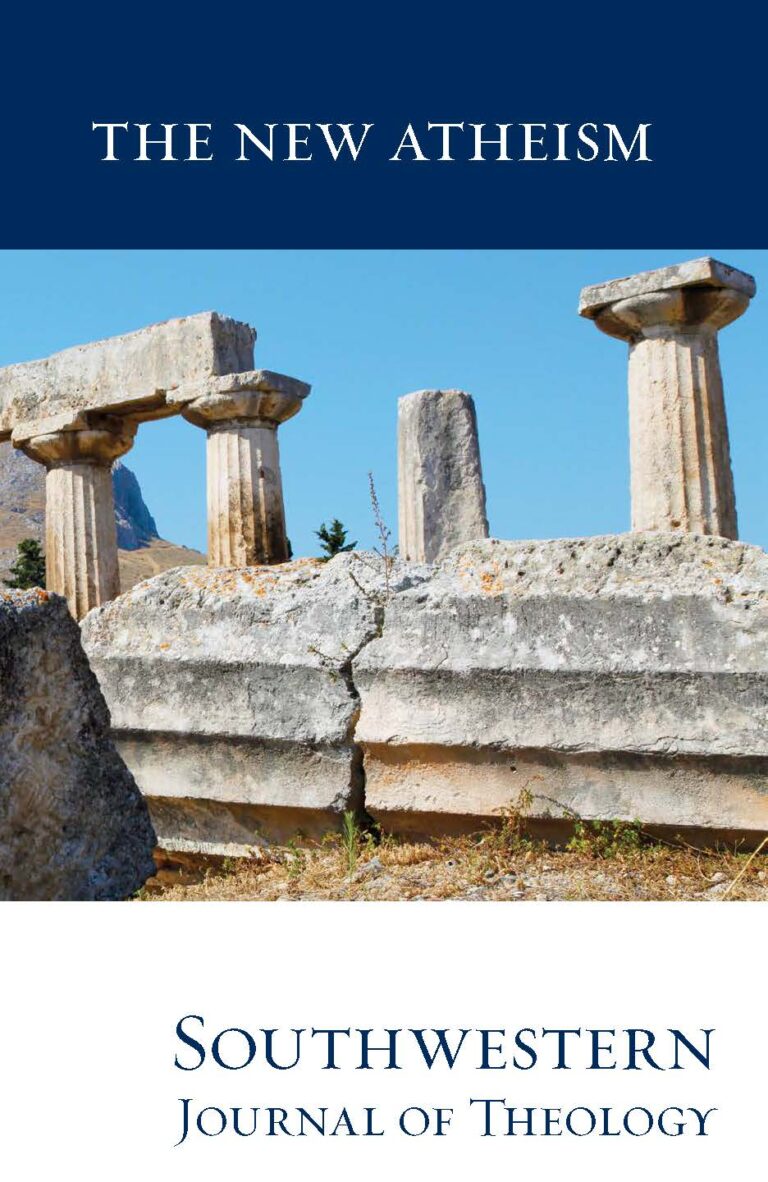
The New Atheism
Southwestern Journal of Theology
Volume 54, No. 1 – Fall 2011
Managing Editor: Malcolm B. Yarnell III
This issue provides an apology to the aggressive movement known as new atheism. Apologetics is a Christian discipline that bases its raison d’être on the biblical mandate and examples of Christian apologia. For instance, Paul in Acts 26 provided a lengthy apologia to that urbane ruler, Agrippa II, the last of the Herodians. Drawing upon his cultural and religious history, the apostle quickly came to the focus of his apologia, the resurrection of Jesus Christ and his own life-changing encounter with the Resurrected One. Paul’s understanding of apologetics was not merely rational, though it was that, but also relational, personally and affectively, and its rational-relational aspects found their fulcrum in the gospel.
Similarly, in this issue of Southwestern Journal of Theology, this semi- nary’s leading apologists bring both pristine logic and personal affection to their God-given task. Apologetics, which Southwestern Seminary places within philosophical and ethical studies, has an important position among the classical theological disciplines. Biblical studies consider the foundation of the faith; theological studies offer critical reflection on the communication of the faith from Scripture; preaching and pastoral studies, as well as missions and evangelism, dwell upon the proper communication of the faith. If the purpose of apologetics is to defend the faith, the place of apologetics is to come alongside the preacher, the evangelist, and the missionary in offering a reason to those outside the community why the Christian faith is believable and preferable.
Each of the authors in this volume exemplify why and how apologetics functions. For instance, John Laing, of Southwestern’s Havard School, has not only completed the huge task of bringing these essays together, but he has contributed two fine articles himself. The first uses the legacy of Alvin Plantinga as a means to introduce the subject of new atheism and how Southwestern’s apologists have chosen to address it. His second essay describes how evangelicals ought to engage the new atheists with subtlety and empathy. He concludes, with a superb blend of rationality and relationality, “Apologetics is both an intellectual and spiritual exercise and should always begin with prayer born out of love for the lost.”
Second, John Howell interacts with perhaps the most venomous of the new atheists, Richard Dawkins. Howell’s rejoinder exposes the irrational basis of Dawkins’ atheism, meanwhile demonstrating how the various arguments for the existence of God should be properly conceived and wielded. Where Dawkins is guilty of “a question-begging and reductionistic view,” Christians should provide a reasoned yet spiritually sensitive response. Howell concludes that the real problem for Dawkins is not reasonable but hamartiological.
Third, apologists draw upon both natural theology, which is limited to the general revelation of God, and dogmatic theology, which relies supremely upon the special revelation of God in Christ through Scripture. John Wilsey’s article demonstrates the capability of general revelation to convert an honest intellectual to theism, while also implicity affirming that general revelation is not enough, for the special revelation of Jesus Christ is required for salvation. Antony Flew may have accepted God as a postulate after years of debating Christian apologists, but that did not mean he became a Christian. Something else is required, and this is where the disciplines of preaching and evangelism must step forward.
Fourth, Bill Dembski puts in writing a talk he has given in several venues. In “How to Debate an Atheist—If You Must,” Professor Dembski draws heavily upon the means of grace known as the Word of God to exemplify how apologetics can, through the Holy Spirit, become another channel of that divine means of grace. According to Psalms 14 and 53, “the fool has said in his heart that there is no God.” With his characteristically subtle wit, Dembski argues that there really are no atheists; there are just foolish people who “said” they are atheists.
Finally, there are a number of important book reviews that should be noticed in this issue, not only in the area of philosophy, but inter alia in biblical studies, theological studies, and historical studies. We begin with a series of “outrageous quotes” made by the new atheists themselves so that the reader can gain a sense of how belligerent the new atheism is.
As for the title, “The New Atheism,” let it be noted that atheism is not new, for it is as old as man’s rebellion against God. The new atheism is “new” only in the sense of its cantankerous desire to defeat belief in God in the public square. Atheism is not new and neither is its result: divine judgment on such foolishness. The new atheists will discover that the God they say does not exist will remain the same living God long after their vain attempts to build a godless civilization have collapsed into ruins.





